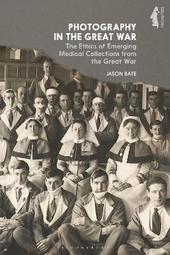
|
Photography in the Great War: The Ethics of Emerging Medical Collections from the Great War
Hardback
Main Details
| Title |
Photography in the Great War: The Ethics of Emerging Medical Collections from the Great War
|
| Authors and Contributors |
By (author) Jason Bate
|
| Series | Facialities: Interdisciplinary Approaches to the Human Face |
|---|
| Physical Properties |
| Format:Hardback | | Pages:240 | | Dimensions(mm): Height 234,Width 156 |
|
| Category/Genre | Photography and photographs
First world war |
|---|
| ISBN/Barcode |
9781350122048
|
| Classifications | Dewey:362.4086970941 |
|---|
| Audience | | Tertiary Education (US: College) | | Professional & Vocational | |
|---|
| Illustrations |
36 bw illus
|
|
Publishing Details |
| Publisher |
Bloomsbury Publishing PLC
|
| Imprint |
Bloomsbury Academic
|
| Publication Date |
13 January 2022 |
| Publication Country |
United Kingdom
|
Description
This book draws on a rich set of materials to examine postwar experiences of ex-servicemen who were facially-disfigured during the First World War. Weaving together medical, institutional, amateur and family photographic albums under a social history framework, Jason Bate underscores overlooked aspects of these men's continued hardships after returning home from the front. In particular, a focus is on the private sphere of the family and the complicated world of employment that disfigured veterans navigated on their return. Little attention has hitherto been paid to the aftercare of disfigured veterans once discharged from the army, or the long-term impact on individuals, and the sense of burden felt by families and local communities. In addressing this neglected area, the chapters here illuminate different practices of photography by doctors, nurses, press agencies, and families across the generations to challenge our perceptions of the personal traumas of soldiers and civilians.
Author Biography
Jason Bate is Research Fellow at the History and Theory of Photography Research Centre, Birkbeck College, University of London, UK
ReviewsDrawing upon fascinating visual documents and testimonies, this book showcases the role of photography as a practical and psychological tool in the treatment and rehabilitation of disfigured ex-servicemen. A timely contribution to discussions on the visibility of medical and military archives, it uncovers the complex networks of actors - past and present - involved in caregiving. * Marjorie Gehrhardt, Associate Professor in 20th-Century French History, University of Reading, UK *
|